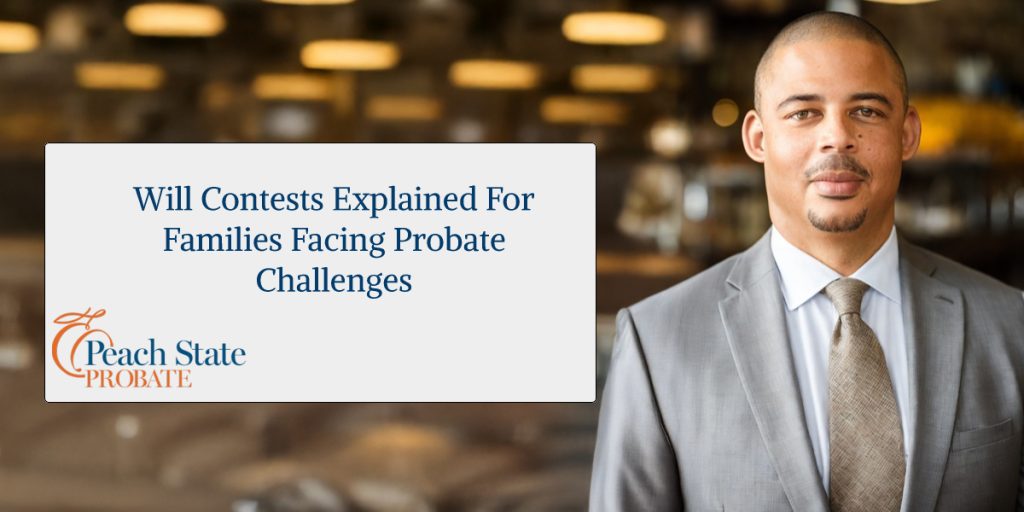## Understanding Will and Trust Contests for Families Facing Probate Challenges
Navigating the complexities of probate can be especially challenging for families dealing with disputes over wills and trusts. Will and trust contests are legal disputes that arise when someone challenges the validity of a deceased person’s will or trust, often leading to prolonged emotional and financial strain for family members. Understanding the intricacies of these contests is crucial for navigating probate challenges effectively.
Effective resolution of contests can make a significant difference in the outcomes of inheritance for families. Legal terms can create confusion and uncertainty, especially for those who are already grappling with loss. Therefore, breaking down the concept of will and trust contests becomes essential for equipping families with the knowledge needed to navigate these turbulent waters confidently.
Grasping the fundamental aspects of will and trust contests allows families to make informed decisions. This understanding can lead to better communication among family members and serve as a foundation for approaching legal counsel when necessary.
## Defining Will and Trust Contests
Will and trust contests are legal challenges that question the validity of a deceased individual’s will or trust document. These contests can arise from various factors including a lack of proper execution, issues with the testator’s mental capacity, undue influence, or even fraud. Each of these factors can serve as grounds to contest a will or trust, leading to a formal legal dispute where the courts must determine the document’s validity.
One of the most common grounds for a contest is the assertion that the deceased lacked the capacity to create a will or trust at the time of its signing. This is particularly relevant for older adults facing health issues that may impair their judgment. Additionally, claims of undue influence from a family member or caregiver can challenge the integrity of the documented intentions of the deceased.
Legal proceedings for will and trust contests can be complex and may require thorough investigation and documentation. Understanding the ground rules of these contests can help families either defend a contested document or assert their claims rightfully.
## Importance of Understanding Will and Trust Contests
The significance of understanding will and trust contests cannot be overstated. For many families, a will or trust represents their loved one’s final wishes regarding the distribution of their assets, making any challenge to these documents deeply personal. A contest can cause emotional distress, family rifts, and financial burdens that impact all parties involved.
Understanding the mechanics of will and trust contests equips families with the tools necessary to protect their interests. This can facilitate clearer communication and negotiations among heirs and beneficiaries, potentially mitigating prolonged disputes. Legal nuances involved can create high stakes, often affecting not only monetary distributions but also familial relationships.
Furthermore, awareness of the potential for contest can encourage families to engage in proactive estate planning. This includes ensuring proper execution of documents and discussing intentions openly, which can significantly limit the grounds for a future contest and lead to smoother transitions during probate.
## Legal Framework Surrounding Will and Trust Contests
The legal framework for will and trust contests in Georgia is established primarily through statutory and case law. Understanding the existing laws can provide clarity on what constitutes a valid will or trust and the specific grounds for contesting these documents. In Georgia, there are strict requirements concerning the execution of wills, including witness signatures and obtaining notarization. Any failure to comply with these requirements could be grounds for a contest.
Estate planning litigation often revolves around claims related to “testamentary capacity,” which refers to the deceased’s ability to understand the nature of their actions when drafting a will or trust. Factors influencing this capacity can include mental health conditions, medications, or age-related decline, all of which must be carefully documented and argued in court.
Additionally, Georgia law has stipulations regarding undue influence, requiring that the claimant demonstrate not only that undue influence was exerted but also that such influence directly impacted the outcome of the will or trust. Legal cases cited by the courts can act as precedents, affecting future rulings in similar contests, thus creating an ever-evolving legal landscape that necessitates knowledgeable guidance.
## Real-World Examples of Will and Trust Contests
Real-world examples of will and trust contests can illuminate the complex emotions and disputes that commonly arise in these legal matters. One notable case involved a lengthy legal battle between siblings over their mother’s estate, where one sibling claimed the will was outdated and not reflective of the deceased’s final wishes. Through evidence gathering, testimonies from friends, and documentation of the mother’s evolving preferences, the court ultimately ruled in favor of the sibling who maintained that the contested will was invalid.
Another case highlighted issues of undue influence. A family member was accused of manipulating a relative suffering from dementia to alter their will drastically, favoring the family member while sidelining other legitimate heirs. In this situation, evidence was provided illustrating the changes to the will’s terms coinciding with the onset of dementia symptoms, reinforcing the argument of improper influence.
Family dynamics often complicate these contests further, as disputes over inheritances bring to light long-standing issues among family members. It’s crucial for families to recognize that while the law provides mechanisms for contesting wills and trusts, emotional considerations can weigh heavily on resolution efforts. Each case presents unique challenges that underscore the need for individualized legal guidance.
## Steps to Take When Facing a Will or Trust Contest
Families facing a will or trust contest can take several proactive steps to prepare for the evolving situation. First and foremost, gathering all relevant documentation, such as the original will, trust agreements, and any amendments, is essential. This foundational step helps establish the framework of the dispute and will be vital in any legal proceedings.
Next, it is important to communicate openly among family members about the contest. Transparency can often mitigate misunderstandings and prevent escalation into a more contentious dispute. Schedule family meetings to discuss perspectives and concerns, with a mediator if necessary. Effective communication can sometimes pave the way to amicable resolutions without the need for extensive litigation.
Lastly, seeking legal counsel should be a priority. Experienced attorneys specializing in probate matters offer invaluable insights into the contesting process and can help families understand their rights and options effectively. Early legal intervention can prevent costly errors and ensure that steps are taken in compliance with the law.
## Common Mistakes to Avoid in Will and Trust Contests
Avoiding common pitfalls can significantly affect the outcomes of will and trust contests. One common mistake is failing to adhere strictly to legal requirements for filing the contest. Each state has its own time limits and procedural rules; missing a deadline can disenfranchise your claims, regardless of their merit. Understanding the specific statutes and following them carefully is crucial.
Furthermore, emotions can run high during these disputes, leading to rash decisions. Families often resort to making public accusations or discussing the contest in non-legal settings, which can complicate matters further. Maintaining professionalism and discretion fosters healthier family interactions and preserves the integrity of your legal position.
Lastly, underestimating the importance of documentation can be detrimental. Gathering evidence, including emails, letters, and records that support claims of capacity or undue influence, can prove vital in court. A lack of documentation often results in weaker arguments, making it essential to approach the contest with a meticulous organizational style.
## When to Consult an Attorney
Knowing when to consult an attorney can significantly impact the outcomes of will and trust contests. An early consultation is often advantageous when family members express doubts about the validity of a will or trust. Delaying legal intervention might exacerbate confusion or lead to irreversible legal missteps that can complicate matters further down the line.
Additionally, it is wise to seek legal advice during the gathering of evidence. Legal professionals can guide families on how to compile pertinent documents and identify useful witness testimonies. Their experience in handling similar cases equips them to protect families’ interests adequately during this sensitive phase.
Lastly, if the contest escalates into litigation, an attorney’s absence could leave individuals vulnerable. Navigating the legal system without representation may lead to unpreparedness for court appearances or negotiations. In any case involving contested wills or trusts, prudent families recognize the need for knowledgeable legal backing to advocate for their best interests.
## Advantages of Legal Representation in Will and Trust Contests
Legal representation can provide substantial advantages in managing will and trust contests. Skilled attorneys understand the intricacies of probate law and can interpret legal jargon, providing clarity in complex situations. Their knowledge can help families understand their rights and what to expect throughout the contest process.
Additionally, attorneys can bring a level of objectivity that is often lacking in emotional family disputes. This detachment allows them to assess situations more critically, developing strategies based on legal merit rather than personal feelings. They can negotiate on behalf of their clients, seeking amicable resolutions while optimizing outcomes.
Moreover, having an attorney can lend credibility to a family’s position. An attorney’s involvement can signal to the opposing party the seriousness of the claims being made. This often encourages better communication and may result in more favorable settlement discussions, potentially avoiding protracted litigation.
## How Peach State Probate Can Assist You
Peach State Probate specializes in estate law in Georgia, ensuring families receive personalized legal assistance tailored to their unique situations. Understanding the turmoil surrounding will and trust contests, Peach State Probate emphasizes compassion while providing professional guidance. The firm is dedicated to protecting clients’ interests throughout every stage of probate.
With extensive experience in dealing with will and trust contests, Peach State Probate is equipped to offer strategic advice and representation. Their legal team understands the nuances of Georgia probate law, enabling them to navigate potential pitfalls that clients may overlook. This depth of knowledge ensures clients are well-prepared regardless of how a case unfolds.
Furthermore, Peach State Probate values open communication and collaboration with families. They aim to make clients feel empowered by keeping them informed and involved in all processes. Their commitment to transparency fosters trust and promotes a sense of security during one of life’s most challenging times.
## Frequently Asked Questions (FAQs)




